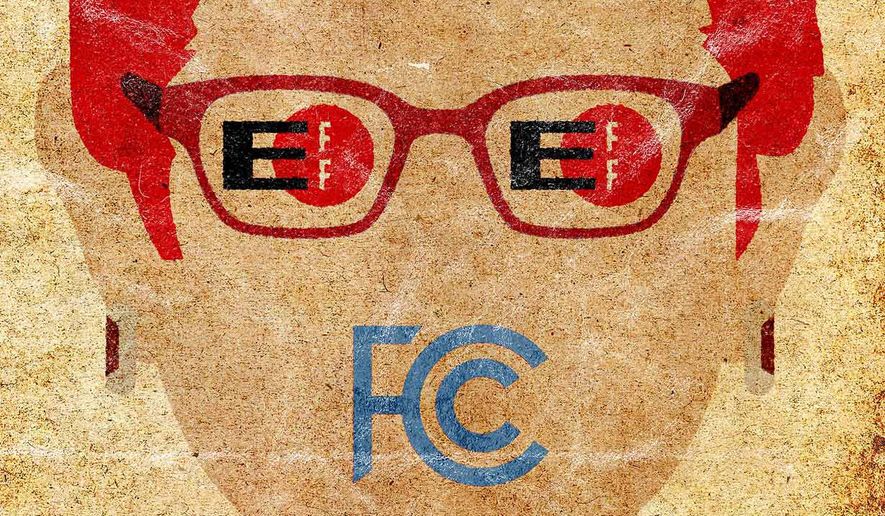OPINION:
President Joe Biden has appointed a robust new team of antitrust enforcers, and the big tech monopolies — Google, Facebook and Amazon in particular — are now facing a comeuppance the likes of which we haven’t seen since the breakup of the oil, rail and steel trusts of the early 20th century.
But it wasn’t long ago — just six years — when Big Tech achieved not just monopoly status but near plenary political power and something about which economists on the Left and Right profoundly worry — regulatory capture.
Regulatory capture refers to when a company or industry becomes so politically powerful as to commandeer regulatory agencies to do their bidding and thereby expand their market power. And it can be one of the worst perversions of the free market and democratic governance — all simultaneously.
I was introduced to this idea when, as counselor to the FCC chairman and deputy chief at the Broadcast and Cable Bureau in the 1970s, I regularly saw established lobbyists trying to play this game. And more recently — when my business was targeted — I learned how the dark art had matured.
In January 2016, the FCC announced a proposed new rule that would allow Google and other Big Techies to market television and film content on their devices without paying license fees to the studios and programmers — like Crossings TV, a network serving the Asian American community — that created them. We do the hard work and foot the bill, and the tech oligarchs get a government permission slip to strip-mine the profits.
Black, brown and Asian American Pacific Islanders (AAPI) programmers — for whom the proposal would have been nothing short of a death sentence — and civil rights leaders, labor unions and the creative guilds all screamed murder over the almost Soviet-style annexation of rights.
The idea should have been known as the Digital Sharecropping Rule and was greased by a kind of copyright anarchy and cult-like genuflecting to tech oligarchs that had narcotized many activists on the far left.
Behind this incredible regulatory sweetheart deal was Gigi Sohn, a professional beltway organizer and activist who, ironically, is now Mr. Biden’s nominee as the FCC’s fifth commissioner. Ms. Sohn, whom I know personally, was a senior staffer to the chairman of the FCC in 2016 and is widely credited with leading the effort.
Not surprisingly, before her stint at the FCC, Ms. Sohn had founded a “consumer” group called Public Knowledge, which was handsomely funded by Google and often did the Leviathan’s bidding. That’s sort of how the insider game of Regulatory Capture game works: Sponsor groups, lobby for their appointment to key regulatory agencies, and then seek favors.
But this pattern of fawning over the tech elites at the expense of “out-of-favor” little guys is well documented on Ms. Sohn’s part — and that makes her nomination somewhat puzzling. In 2015, she played a leading role in the FCC’s media ownership rules widely decried by civil rights leaders for its “lack of any meaningful progress on diversity initiatives” and for “summarily dismiss[ing] 23 specific diversity proposals without analysis.” Sohn is also closely affiliated with the Locast service recently shut down by a federal judge for blatant content theft and has bizarrely stated that “copyright law … is completely ridiculous in the digital age” — music to the ears of Big Tech.
This all said, what is most troubling is the patronizing mindset she’s displayed toward minority communities — an all-too-familiar strain of “progressivism” that invokes our cause and showcases our voices when convenient but then belittles us if we challenge their central-planning orthodoxies.
When civil rights leaders took positions on telecom issues that were opposed to the ideological agenda of her organization, Ms. Sohn suggested that telecom policy debates are “not in the core expertise or core goals” of civil rights groups and stated that any groups opposing her views were not “being thoughtful about it” and “run the risk of being flushed.”
Ms. Sohn was roundly rebuked by the NAACP for these statements but later doubled down and pushed the highly offensive argument that civil rights groups that disagree with her are illegitimate.
This sort of elitist “I know better than you about your constituents” attitude is not only offensive but poisonous to the public square. Rather than debating something honestly on the merits, it seeks to shut down any debate because the writer’s knowledge (in this case, that of Ms. Sohn) is so vastly superior to anything a civil rights leader with another opinion could offer.
We must get the FCC to a fully functioning five commissioners. But we should be able to insist, at a minimum, that nominees are not doing the bidding of their previous patrons and that they have a genuine interest in listening to and bridging the concerns of diverse leaders, rather than showing contempt for any that speak their own minds.
• Frank Washington is CEO of Crossings TV.




Please read our comment policy before commenting.